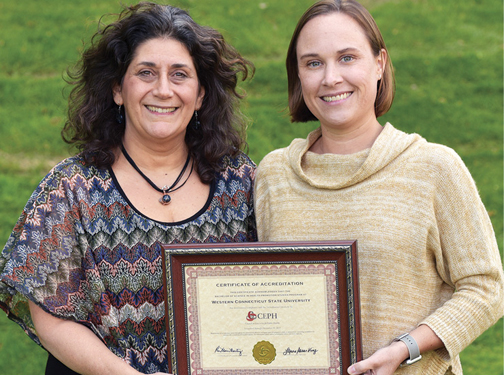It took three years and an extensive amount of data collection and paperwork, but the Health Promotion Studies bachelor”™s degree program at Western Connecticut State University (WCSU) now has national accreditation from the Council on Education for Public Health.

The council is an independent agency that is recognized by the U.S. Department of Education as the governing body for the nationwide accreditation of schools of public health. It was established in 1974 by the American Public Health Association and the Association of Schools of Public Health, but it only began accrediting undergraduate programs in 2012, having previously focused on graduate and doctorate programs.
Robyn Housemann, chairwoman of WCSU”™s Department of Health Promotion and Exercise Sciences (HPX), noted that the school filed its accreditation application in the summer of 2015 and began a self-study process to provide the council with required data on the depth and scope of the school”™s academic environment, and not just the HPX curriculum.
“This also included the library, student services and computer facilities at the university,” she said. “We had to look at all of the full-time and part-time faculty for their credentials.”
Housemann collaborated with HPX Associate Chairwoman Emily Stevens on several report drafts and responses for the council’s review process. This spring, the council sent a team of reviewers from the public health profession and academia sectors to visit the campus in Danbury and interview faculty, students, alumni and community representatives on the HPX program.
“We had reviewers from different areas of the country and different areas of expertise visit us,” Housemann said.
The WCSU undergraduate curriculum in Health Promotion Studies presents students with four academic options: community health; wellness management; holistic and integrative health; and allied health professions. Part of this program involves a service learning project, where students are tasked with developing, implementing and assessing health promotion programs for university and community organizations.
The program also involves a semester-long, 450-hour internship within a local workplace setting as well as preparation for the Certified Health Education Specialist examination, the nationally recognized credential for health educators.
The council’s board voted on Sept. 7 to award accreditation to the undergraduate Health Promotion Studies program. The council also voted to make the initial accreditation date retroactive to Oct. 24, 2015, and WCSU”™s accreditation will extend for a five-year period that concludes on Dec. 31, 2023 ”” with Housemann and her colleagues facing another go-around of data collection and drafting reports to renew the council’s approval.
“It is a continuous quality improvement,” Housemann said. “This ensures we”™re doing the best we can to train students for their chosen field. It”™s a good thing. It”™s a lot of work, but it”™s a good thing.”





















